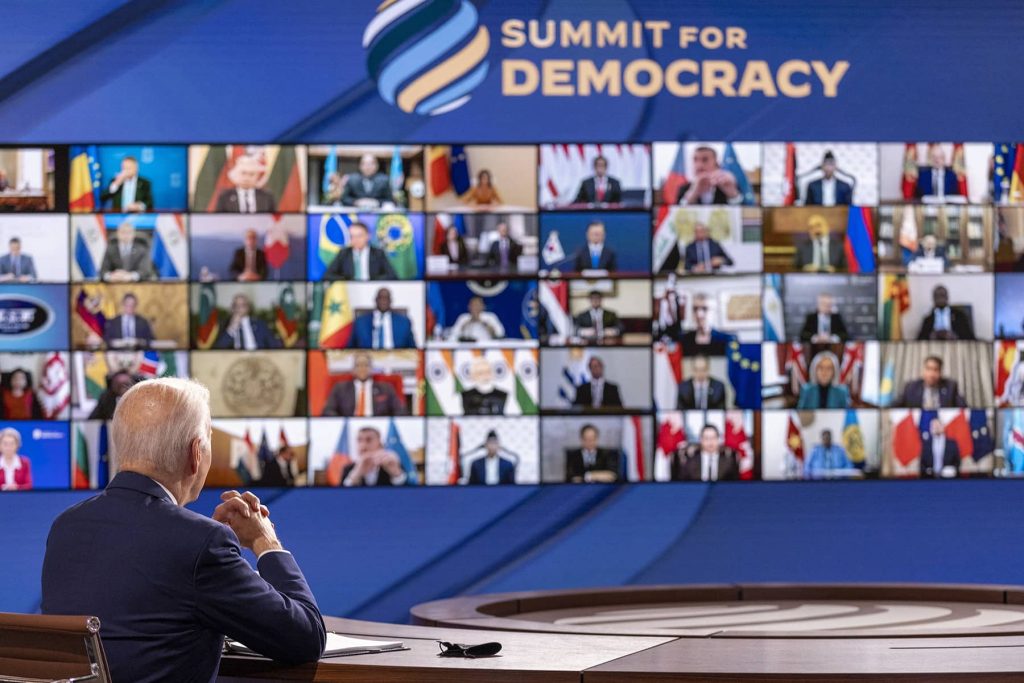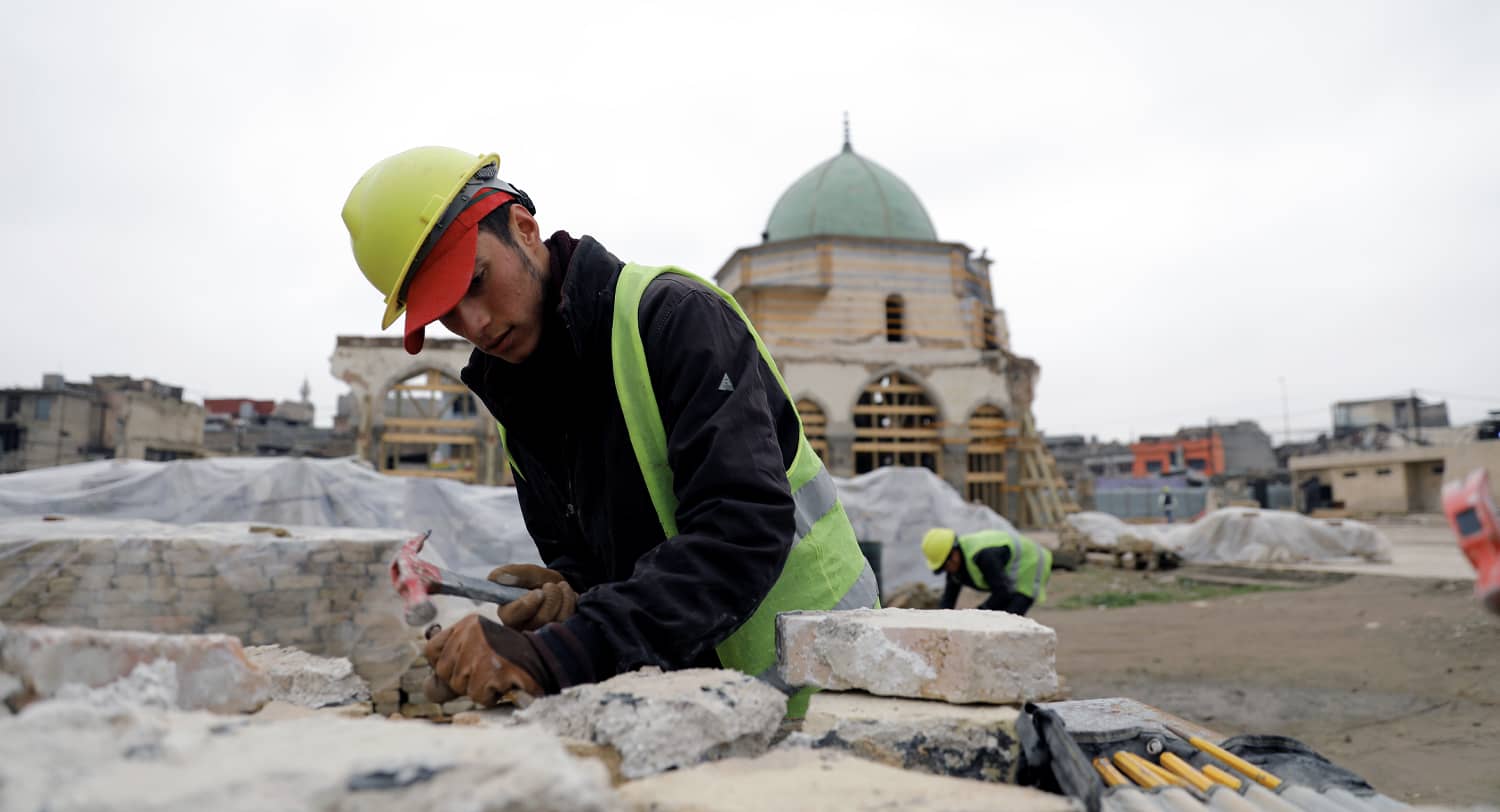Nation building is a US policy for transforming post-conflict countries, a policy discredited among a broad swath of Washington because of Iraq and Afghanistan. But I question this consensus and recommend rehabilitating the policy in time to help reconstruct postwar Ukraine.
>> Diplomatic Dispatches: Read more from Robert Silverman
Didn’t the US role in postwar Japan show that democracy can be transferred to non-Western countries? Hasn’t nation building in South Korea, Colombia, Bosnia, and Kosovo been fairly successful? Weren’t the results in Iraq very different from those of Afghanistan? And won’t the US be called upon in the future to help reconstruct postwar states?
Let’s start with a story.
Appointment in Samarra
I was late for my appointment in Samarra. In retrospect, I like to think I was intentionally varying meeting arrival times, as civilians in postwar Iraq learned through experience, to reduce the chances of an ambush by insurgents. But honestly our three-car convoy was late in leaving the palace compound in Tikrit for the hour drive south to the fabled city of Samarra, the largest city in the province of Salah al-Din where I led a civilian governance team.
It was early January 2004, a new era for Iraq. The US military had captured Saddam a month before, hiding out in a hut in the midst of a tangerine orchard across the Tigris and within sight of his childhood home, al-Awja. The orchard was owned by the maternal relatives of one of his bodyguards. (Lesson learned from the search for Saddam: Mothers have clan alliances, sometimes more powerful that those of fathers for being less public. See Book of Genesis/sons of Rachel and Leah, and King Ibn Saud/sons of Hussa bint Ahmed al-Sudairi.)

We arrived in Samarra about 10:40 am and pulled into the parking lot next to the municipal building where voting was to take place. The first thing I noticed were small reddish-tinged puddles and reddish chunks amid the gravel of the parking lot. A car bomb had gone off in the lot right at our appointment time of 10:00 am, killing several bystanders waiting to vote. The parking lot attendant had disappeared.
We walked inside the municipal building, over the broken glass from the blown-out windows and upstairs to the polling place. There was acting mayor Adnan Thabit, in traditional kaffiyeh and robe, seated and talking with the municipal staff who were sweeping up debris from the bomb. A former Iraqi general imprisoned by Saddam, Thabit radiated calm, even bonhomie. He had seen much worse than this attempt to scare people; the elections would be rescheduled.
Indeed the elections in Samarra were rescheduled and held without further violence. The first free elections for the province’s legislature were held in February, and the newly elected council began meeting in March 2004. The fight with al-Qaida in Iraq, predecessor to the Islamic State of Iraq and Syria (ISIS), was just starting and Samarra would remain a hot spot in that fight. But Iraq’s fragile, imperfect democracy held together. With the help of the US military, Iraq’s elected governments eventually defeated successive waves of attacks of Baathists and Islamists seeking to retake Baghdad and gain power.
One year ago, in December 2021, when President Biden convened the Summit of Democracy in Washington, the two Middle East countries represented were Israel and Iraq.
Was Iraq’s democracy, fragile as it is, worth the destruction wrought and the lives lost? What I know is that there is no casualty-free, cost-free option for US foreign policy in the Middle East, including complete withdrawal. To paraphrase Leon Trotsky on war, you may not want the Middle East, but the Middle East wants you. That is not a justification for invading, occupying, and remaking Iraq. But it is a reason not to dismiss nation building as a policy option out of hand, without studying the recent US experiences in Iraq and Afghanistan.

What’s in a Name?
The term “nation building” is misleading and arrogant (although it’s better than the term “pacification” used for this activity in the Vietnam War). It implies one nation initiates or creates another. I know of no such case in modern history. Nations arise through efforts of their own people, usually over centuries. One nation can create and sustain key institutions for another, for instance, the US creation of Japan’s postwar constitution or the US-led establishment of a federal government for Bosnia.
More accurate terms would include “institution building” or “state building.” Nation building has become common usage, however, for the full range of security, political, social, and economic activities by one country in another, in the context of post-conflict stabilization and reconstruction.
Conditions for Success
Each case is different. Some involve a military defeat and overthrow of the prior regime while others do not (an example of the latter is Colombia). Nevertheless, three conditions for success would seem to apply in all cases.
Commitment and resources of the intervening country
The most successful cases of US nation building are Germany, Japan, and South Korea. In the aftermath of World War II, the US represented nearly 50% of world gross domestic product; it didn’t need other countries’ economic help in reconstructing these countries’ national institutions. It had the resources and also the domestic public commitment to stay in all three.
Today, the US doesn’t dominate the world economy as it did after World War II and would need economic help from its European and other allies to sustain nation building. Europeans have supported the US-led efforts in Bosnia and Kosovo but less so elsewhere. Equally important, the American government, and by extension the American public, need to be committed to staying in the other country for the long period needed for successful nation building.
Political culture, economic development, strategic importance of the intervened country
Even with all of the resources in the world, nation building will not be successful in countries that lack a political culture and stage of development conducive to building national institutions. That doesn’t require a modern industrialized economy or a Western-oriented political culture, but it does imply a tradition of a centralized state with national institutions, including economic ones, widely accepted in the intervened country.
Also important are local leaders who will work with the intervening country in creating the new institutions and grow them organically in their societies.
This practical view of nation building focuses on institutions and jettisons the “winning of hearts and minds” and ideological baggage associated with some prior efforts. We must not require that the intervened country become a liberal market democracy to begin nation building, even if we hope that is where it is eventually headed (as eventually happened in South Korea). We must be flexible in adapting the new national institutions to the society where the nation building must take root.
Finally, countries that have conducive conditions for nation building may still not be good candidates if they aren’t sufficiently central to the national interest of the intervening country and the intervention cannot be justified on international legal grounds such as UN Security Council resolutions. Otherwise, domestic discontent can erode the intervenor’s staying power. Nation building is risky policy, and a detailed assessment of the long-term prospects for success and strategic importance of the target country must be taken before jumping in.
Area experts to carry it out
A comparative look at Iraq and Afghanistan suggests a third condition for success: area experts needed to perform the assessments and carry out the nation building.
Iraq had conducive conditions for nation building: a long tradition of the centralized state, a relatively literate population, and national economic institutions. Its oil resources, large population, and strategic location make it important. Thanks to effective stewardship of its oil revenue for a ten-year period starting in the late 1940s, Iraq had a good school system and modern infrastructure that knitted the country together, despite ethnic differences. At its economic height in 1981, right before Saddam embarked on a series of disastrous wars, Iraq had a per capita income comparable to some southern Europe countries. Twenty years later, thanks to Saddam’s wars and resulting UN sanctions, Iraq was in ruins, with per capita income comparable to sub-Saharan Africa and a dictator still threatening to reinvade his neighbors.
Afghanistan, by contrast, was never a good prospect for nation building. Its modernization efforts never went very far beyond the capital city of Kabul. Its central state always contended with regional power centers backed by their own militias, and its literacy rate, infrastructure, and per capita income were always among the world’s worst. Its sole strategic importance—denying a haven for Islamist terrorists—indicated a need for targeted military strikes and over-the-horizon monitoring, not nation building.
Nation building, just like other foreign policies, must be informed by a detailed understanding of the other country provided by area experts. This ingredient was lacking in the planning for both Afghanistan and Iraq.
US diplomats at the State Department, who had in their ranks the closest approximation to area experts in the US government, were kept out of the initial decision making on Iraq and Afghanistan by the Bush administration. Then, after the US had intervened in both Afghanistan and Iraq in 2003, US diplomats were called upon to staff the occupations. Fortunately, we had a corps of Arab Middle East experts for Iraq but lacked a comparable bench for Afghanistan.
The US mainstream media promoted a view, which took hold in Washington, of Afghanistan as the “good” intervention because we were fighting al-Qaida; Iraq was the “bad” intervention because it was a war of choice imposed by neoconservative Republicans. Notice the focus was always on us, not the foreign country. Thus the Obama administration withdrew from Iraq (only to reinsert troops back in to help defeat ISIS, where they are still), while doubling down on nation-building efforts in Afghanistan, which ultimately failed.
The Short and Long Term
In the short term, we should recognize the US experience with nation building is not over. Whether we like it or not, the US will be called on in the future to help stabilize and reconstruct post-conflict and failing states, perhaps in Haiti, Venezuela, Libya, or elsewhere.
The next great test will be postwar Ukraine, and we should begin planning now. The Ukrainians will have to reimagine and reconstruct the country, ending the rule of the oligarchs and attacking the endemic corruption that defines the country. The US has invested billions to date, with many more billions needed for reconstruction (see Anders Åslund’s estimate); the Europeans must contribute their fair share. The Ukrainians will turn to the US and Western Europe. And that, in turn, requires the US government to have people with the necessary area expertise to ensure success.
Over the longer term, the State Department needs to revitalize area expertise to serve the nation. The most influential American diplomat, whom I wrote about in my first column for JST, was George F. Kennan. According to his official biographer, John Lewis Gaddis, Kennan wasn’t a particularly adroit manager, and he shared many of the prejudices common in the foreign service of his day, but in 1946 he wrote a cable defining the Containment Doctrine, which was adopted and pursued throughout the Cold War.
Kennan’s insights on the nature of the Soviet Union came after years of studying the Russian language at US-government expense and two tours in Moscow. To get future Kennans will require prioritizing area expertise and analysis over other worthy goals.
Did those of us who volunteered and served in Iraq make positive contributions to that country, regional stability, and American foreign policy? The Iraq results are not all in. Amid the terrible cost in lives, there are some good signs that should not be overlooked. But that requires another column.



